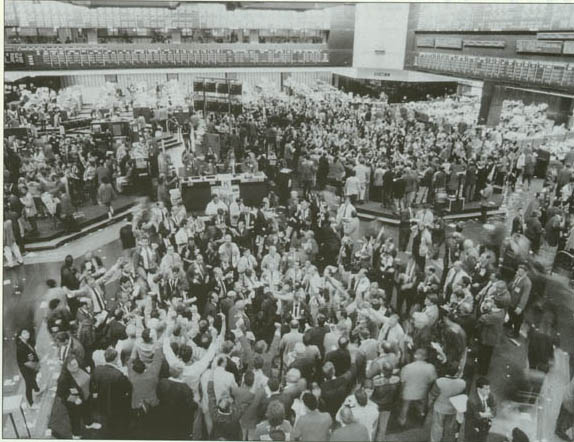 This is what the trading floor looks like today. The chalk board had been replaced by the monitors that give traders access to virtually instantaneous updates on prices and sales, as well as information on other markets around the world. This is what the trading floor looks like today. The chalk board had been replaced by the monitors that give traders access to virtually instantaneous updates on prices and sales, as well as information on other markets around the world.capital on the trading floor. And you know the other side of a trade will he good. And you'll get the best price possible for your trade." In fact, electronic trades now account for 1 0 percent of the trading business, according to Zagotta. His subcommittee also is evaluating hand-held devices traders could use to record trades, to cut back on paper. "We have a huge amount of paper. That's a cost to firms that we want to eliminate," says Zagotta, who also is a member of the board's directors. Nevertheless, while those efforts move ahead, the board's membership has often taken a go-slow approach. Last year, they turned down plans to merge that exchange's back office operations with those of the Merc. And in February, they vetoed a plan to forge an alliance with the Eurex, even though the directors had already approved it. Members argued it was wiser to expand the in-house Project A, rather than take on a partnership with outsiders. Of course, the economic game has always been about change, weighing risks, gambling on wins and losses. There are always shakeouts among entrepreneurs. And workers. Northwestern University's Joel Mokyr doesn't claim to be an expert on the exchanges, but he has studied the historic effect of automation on workers. "Technological breakthrough makes skills obsolete. And you have to learn new skills," says Mokyr, chair of the economics department and professor of history. "Changes in technology go back to the invention of the printing press in the 15th century. It used to be a huge job to copy books. It was all done by hand. With the printing press, most of those people were no longer needed." Nevertheless, the rapid acceptance and use of the printing press led to Western Europe's dominance for the next 400 years. Today's technologies may prove to be as influential. Chicago's exchanges can use those advances, or let the competition pass them by.
|
Pages:|1 ||2 | |3 ||4 | |5 ||6 | |7 ||8 | |9 ||10 | Pages:|11 ||12 | |13 ||14 | |15 ||16 | |17 ||18 | |19 ||20 |
Pages:|21 ||22 | |23 ||24 | |25 ||26 | |27 ||28 | |29 ||30 | Pages:|31 ||32 | |33 ||34 | |35 ||36 | |37 ||38 | |39 ||40 | Pages:|41 ||42 | |43 ||44 |